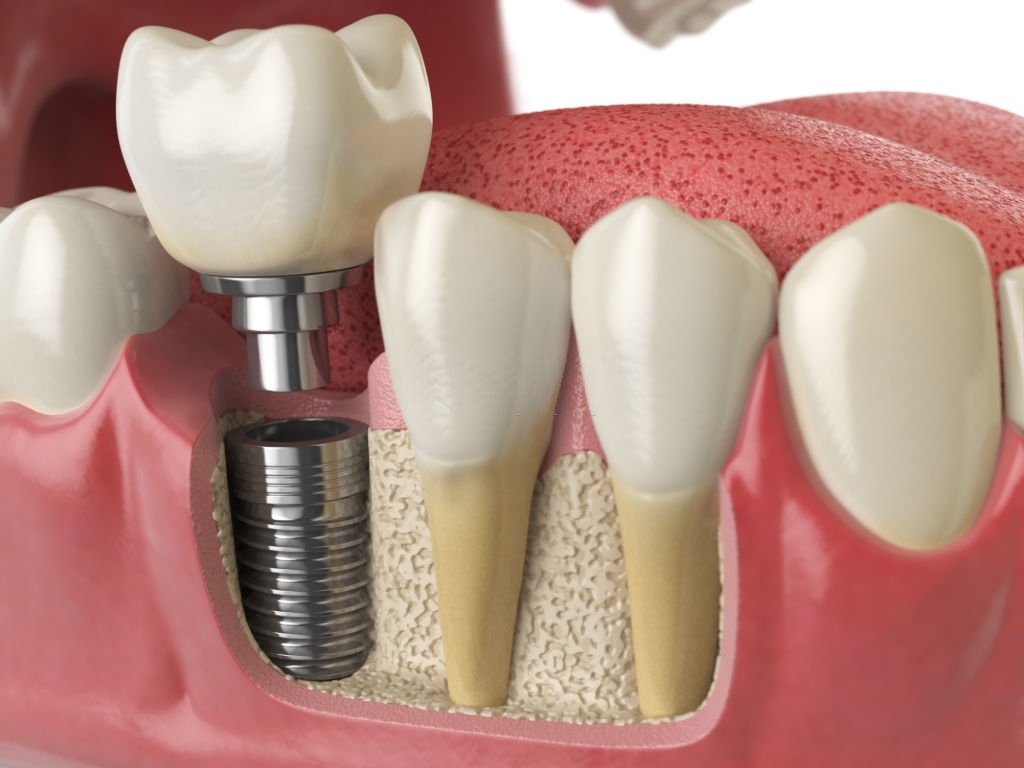Do you:
- Hide your smile because of spaces from missing teeth?
- Feel your dentures are not secure?
- Have difficulty chewing and enjoying food?
- Wish you could smile, speak, and eat in comfort and with confidence, but are missing one or more teeth?
If so, then dental implants could be for you. Dental implants are truly natural looking replacements that are as strong and as comfortable as your own teeth. Not only do they restore your normal appearance, dental Implants make speaking and eating so much easier than wearing dentures.
We carry out single and multiple tooth replacements, using research backed implant systems.


In fact, you can eat the foods you want without having to worry about dentures dislodging. Because they are long term solutions for gaps, we will help you to maintain them now and well into the future. Some questions that our patients have asked in the past…
Implants are placed under local anesthetic which numbs the mouth, so you shouldn’t feel your implant being fitted. After your surgery, you are likely to experience some pain, bruising and swelling which will normally last about a week. This is normal and you will able to go to work the day after your procedure. Your pain should reduce with over-the-counter painkillers. If you’re concerned that your pain is abnormal, you should always consult our dentist. Sedation is available.
The time it takes for dental implants, abutment and crown to be placed varies from person to person. The average length of time is between three to four months. This may be longer depending on your individual needs and for more complex cases. For some cases, an immediate implant can be placed with a temporary crown straight away.
If you clean and look after them properly, implants can last longer than your natural teeth. It’s important to make sure you care for your implant properly to get maximum lifespan out of it and reduce the risk of any infections. The crown on the Implant may need replacing every 10-15 years.
Yes. Because Dental implants are placed directly into the bone, we need to make sure there’s enough bone to support the implant. If you don’t have enough, it’s possible to graft bone from other areas of the body or use a substitute and insert it into the jaw. This may extend the time to having your implant fitted but is essential for the implant to be a success in these cases. Your implanatologist will discuss this with you at your consultation appointment.
Our Dental Implantologist will discuss the price of your treatment plan during your initial consultation. Dental implants can cost more than other solutions for missing teeth, such as dentures and bridges, but offer much more in terms of functioning, comfort, confidence and provide a fantastic longer-term solution.
The average price of a dental implant in the UK (including the implant, abutment and crown) is around £2,500 but costs vary depending on individual needs and requirements.
We offer payment plans with a 0% finance option available. Payment plans provides a simple and affordable way to spread the cost of your dental treatment with a 0% Interest Loan over 10 months. This can be made over a longer period.
- No need in putting off dentistry which may result in it becoming more extensive, invasive and expensive.
- You can spread the cost of the treatment over a suitable period. Interest-free and low cost monthly options can be a much more affordable alternative to credit cards or bank loans.
- It’s easy to set up repayments by Direct Debit.
- Our Treatment Co-ordinators can help you with the application – it’s a simple process.
Dental implants can be suitable for adults of any age. Implants are not recommended for under 18s as the jaws are still growing and the bone tissue has not fully developed yet. We can start the process by planning these cases but will have wait until it is appropriate.
You will be assessed for your suitability for treatment. Occasionally, dental implants might not be recommended for some patients for medical reasons. For example, if you have had radiotherapy to your jaw or if you have diabetes which is not under control. If you smoke, you will be advised to give up before having an implant fitted. Evidence shows that the rate of implant failure is higher for those who smoke as well as those with uncontrolled diabetes. Certain medications may affect implant success, however the vast majority of patients are suitable. Our implantologist will take your medical history and discuss other options if implants are not suitable.
Yes, you can. Dentures are a popular solution to replace missing teeth, but people sometimes choose to replace their dentures with implants because they’re fixed into the jaw so there is no need for denture adhesives. Please click here to see what denture treatments are available.
No, every tooth replaced does not need an implant. For example, if you have three missing teeth, 2 implants may be enough to support a bridge which will fill the space with three teeth. Another example is when you have lost all of your lower teeth, six implants could be placed which may support a bridge.
Implants are only available on a private basis. In rare occasions it may be available on the NHS if teeth are lost due to mouth cancer or severe trauma.
If you would like to know more contact our clinics and our treatment coordinator will be happy to discuss the process, stages and treatment options with you.


